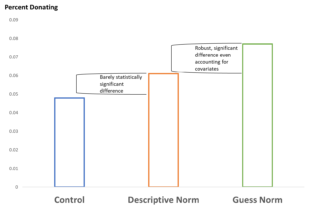Take a Guess to Increase Conversion
What percentage of Americans donate to charity in a given year? Take a guess. No really. What’d you guess? Was it less than 7 in 10 Americans? If so and if I tell you the percentage is 73% (a recent Gallup 2020 figure) then you’re more likely to donate if I ask you to do it right now. Go ahead, here is my #pleasehelpfundmyretirement.com domain.
This finding was from a recent field experiment asking people at a train station to donate with three different experimental conditions.
- Control condition – person was asked to give, no information about the percentage that give was given or discussed
- Descriptive Norm – before being asked to give the person was told that 68% of Germans donate to charity in a given year.
- Guessing Norm – before being asked to give the person was asked to guess what percentage of Germans give in a given year and then told the correct answer.

Telling people what other people do in a ‘just-the-facts ma’am” way – i.e. descriptive norming – is not something to write home about nor try. It’s barely better than the control, barely.
Asking people to guess first is a much more robust finding. You’ve no doubt already thought of the question that needs to be asked, is there a differential effect depending on whether you guess above or below the actual figure? Good question. Yes and it’s what you’d expect.
Folks that guess over the actual are slightly less likely to donate, likely because they feel they now have moral license or permission to not give. On the flipside, those who guess lower than actual are much more likely to give.
The takeaway here is that if you want to test this in a canvassing or TM environment or even as a rhetorical device for a printed (digital or paper) piece then pick a big percentage like the Gallup source.
Another finding, that admittedly could be noise, is that the guessing condition mediated the effect of rainy weather that otherwise dampens (had to do it) likelihood to give. The possible explanation is the act of guessing diverts attention from the crappy weather to the task at hand.
Kevin



I am curious as to whether this has been tested with any size of US audiences. We know that European attitudes toward charitable giving is different, and programs that work in those markets need to have their strategic approaches tweaked or outright changed for American ones. I’m also interested in whether this was a one-time or sustainer gift ask, and the size of the gift in the ask?
Hi Joanne,
Lots of testing has been done showing all people – regardless of country – can be influenced by knowing what others do. How the effect works or doesn’t is less about country or culture and more about intrinsic factors that cut across country/culture (e.g. personality) and/or context (e.g. quality of motivation created during interaction) that can be recreated anywhere. This was a one-time but can’t think of any reason the effect would differ for sustainer, but maybe. Same for ask amount.